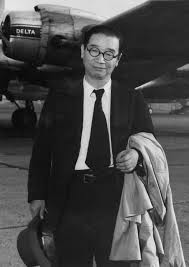Toyohiko Kagawa is one of many exceptional Christians who have been an inspiration to me in my Christian walk. Toyohiko kept going against much opposition and was to achieve one of Japan's highest rewards. AK
Japan has never been very receptive to the gospel. Missions have met little response. The work of such men as Xavier and Nikolai was exceptional in bringing thousands to a Christian confession. The work of others has generally produced only handfuls of converts. This is true not only of foreign missionaries but also of Japan's foremost homegrown missionary, Toyohiko Kagawa.
Japan has never been very receptive to the gospel. Missions have met little response. The work of such men as Xavier and Nikolai was exceptional in bringing thousands to a Christian confession. The work of others has generally produced only handfuls of converts. This is true not only of foreign missionaries but also of Japan's foremost homegrown missionary, Toyohiko Kagawa.
Toyohiko Kagawa was born on this day July 10, 1888, into wealth, the son of a concubine. Both parents died while he was very young. As a teenager he became a Christian under the influence of Presbyterian missionaries and was baptized. He took theological training at Kobe and at Princeton University. After almost losing his life to an illness, he vowed to help the poor.
Japan was then going through great upheavals owing to its transition to Capitalism. Common laborers suffered much during this time. Kagawa moved into a slum in order to witness to the people. "I am a socialist because I am a Christian," he said. He slept in cell-sized hovels sometimes holding the hand of a murderer. He shared himself with all in need. More than that, he organized Japan's first labor and peasant unions. With the coming of Communism he increased his emphasis on the Kingdom of God. His activism convinced the government to rebuild slums.
Kagawa is recognized as a successful author. His wrote a best-selling autobiographical novel,Across the Death Line and another Before the Dawn. His other writings include several pamphlets and meditations. He spent the revenue from his books on relief of the poor while he and his family subsisted on a small monthly salary.
For Kagawa, the cross symbolized the power of the love of Christ and the power of suffering for righteousness' sake. That is why he chose Japan's worst slums as his field of labor and lived among those he sought to help. Kagawa was not highly regarded in theological circles in Japan. Here is his own explanation. "There are theologians, preachers and religious leaders, not a few, who think that the essential thing about Christianity is to clothe Christ with forms and formulas. They look with disdain upon those who actually follow Christ and toil and moil, motivated by brotherly love and passion to serve. . .They conceive pulpit religion to be much more refined than movements for the actual realizations of brotherly love among men. . .The religion Jesus taught was diametrically the opposite of this. He set up no definitions about God, but taught the actual practical practice of love."
The Emperor posthumously awarded him Japan's highest honor, the Order of the Sacred Treasure. One year after Kagawa's death, 103 doctors, professors, patients, workers, writers, teachers and acquaintances issued a two-volume Biography of Kagawa. Each contributed an essay.
Bibliography:
- Axling, William. Kagawa. New York: Harper and Brothers, 1932.
- Eerdman's Handbook to the History of Christianity. Editor Tim Dowley. Berkhamsted, Herts, England: Lion Publishing, 1977.
- Kagawa, Toyohiko. Love the Law of Life. Philadelphia: John C, Winston, 1929.
- "Kagawa, Toyohiko." The Oxford Dictionary of the Christian Church. Edited by F. L. Cross and E. A. Livingstone. Oxford, 1997.
- Neill, Stephen. A History of Christian Missions. The Pelican History of the Church #6. Hammondsworth, Middlesex, England: Pelican Books, 1964.



